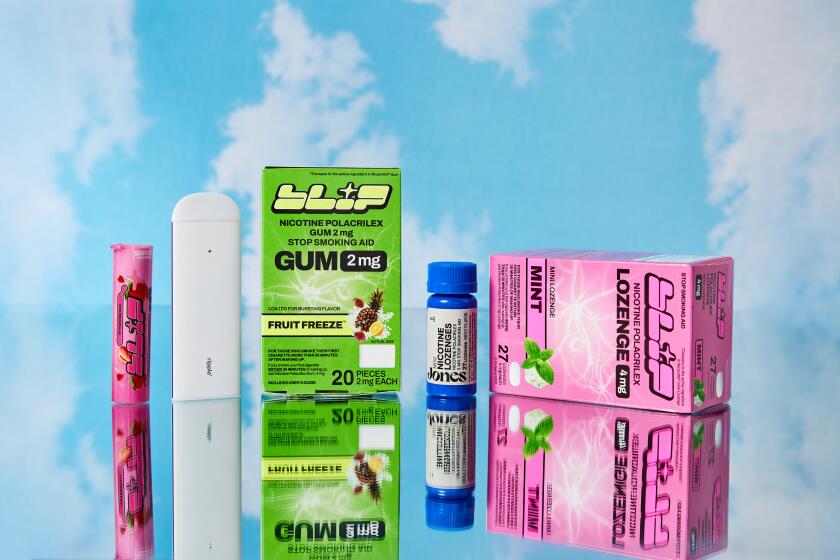Online vape retailers ignore rules meant to protect minors, UCSD study finds

- Share via
To try to keep young people from becoming addicted to tobacco, Congress took two steps in 2020 to keep minors from posing as adults to buy vaping products online: It barred e-cigarette sites from delivering through the U.S. Postal Service, and it required whatever delivery service they did use to check the recipient’s ID.
The state of California added its own twist that year, banning most flavored tobacco products. That prohibition did not explicitly cover online sales, but the city of San Diego is one of a number of local governments that adopted laws to eliminate any potential loophole.
Researchers at UC San Diego, Cal State San Marcos and Stanford decided to test how well those protections were working. If the results in San Diego are any indication, they’re hardly working at all.
The team lined up eight pairs of adults to try to buy flavored nicotine vaping products from 78 online retailers in October 2023. Each team made two identical orders from each retailer, with one buyer ordering from within the city of San Diego and the other in a different city in San Diego County with no explicit restrictions on online delivery of flavored vapes. In each order, they asked for delivery by the Postal Service if it was offered.
Ideally, the researchers would have struck out completely — none of the 156 orders delivered, given the state’s ban on the sale of flavored e-cigarettes, and certainly none delivered by the Postal Service. Failing that, at least the purchasers within the city of San Diego should have come up empty, considering the city’s explicit ban on online sales of flavored vapes.
And even if those measures failed, at the very least, each buyer’s ID should have been checked upon delivery to make sure they weren’t minors.
A rush of Instagram-approved products has flooded the NRT market over the last few years with a new audience in mind: vapers.
The results of the study, which were published online Monday by the Journal of the American Medical Assn., showed that more than two-thirds of the buyers successfully obtained flavored vapes, including almost 70% of the buyers in the city of San Diego — again, where those sales are explicitly prohibited, the study said.
Of the successful deliveries, 80% were handled by the Postal Service, which shouldn’t have carried any of them, the study found. An additional 9% came from services such as UPS and FedEx that have policies against delivering tobacco products.
Finally, 93% of the deliveries were completed with no attempt to verify the buyer’s age. In the vast majority of cases, the products were dropped off without any interaction between the buyer and the delivery person, according to the study. And in only one case did the delivery person scan the buyer’s ID, as required by federal law.
“These results demonstrated pervasive nonadherence to age verification, shipping, and flavored tobacco restrictions among online tobacco retailers,” the study’s authors wrote.
The authors also acknowledged that they examined sales in just one county. But that county has some of the toughest anti-tobacco measures in the country.
With Gov. Gavin Newsom pushing emergency regulations on hemp products that contain intoxicating levels of THC, some worry a zero-tolerance approach will imperil a burgeoning industry.
Eric Leas, an assistant professor at UCSD and director of the Tobacco E-commerce Lab, said in a statement that online sales of e-cigarettes are the largest and fastest growing sector of the tobacco industry.
“There are longstanding surveillance systems in place that help implement laws at brick-and-mortar stores, but we do not have a system in place for online retailers,” Leas said, adding, “The results of this study highlight the need for greater oversight and enforcement of online tobacco retailers.”
A top official at the Vapor Technology Assn., a trade group for the e-cigarette industry, said the study raised “an academic issue that is interesting, but not particularly relevant to what is really happening in this country with respect to youth and vaping products.”
Tony Abboud, the association’s executive director, said vaping by youth has plummeted since the age to purchase these products was raised to 21 in 2019. “The daily use of vaping products by youth is almost negligible,” he said, especially compared to other products that are banned for minors, such as alcohol and marijuana.
Abboud also said the UCSD research didn’t examine the age-verification systems used by online retailers. “There is no reason to believe youth are accessing vaping products online,” he said.
The latest survey by the CDC and the Food and Drug Administration found that although vaping remains the most popular form of tobacco use among minors, the number of middle- and high-school students who said they were currently vaping dropped sharply from 2023 to 2024.
According to the Centers for Disease Control and Prevention, “No tobacco products, including e-cigarettes, are safe, especially for children, teens, and young adults.”
More to Read
Sign up for Essential California
The most important California stories and recommendations in your inbox every morning.
You may occasionally receive promotional content from the Los Angeles Times.













